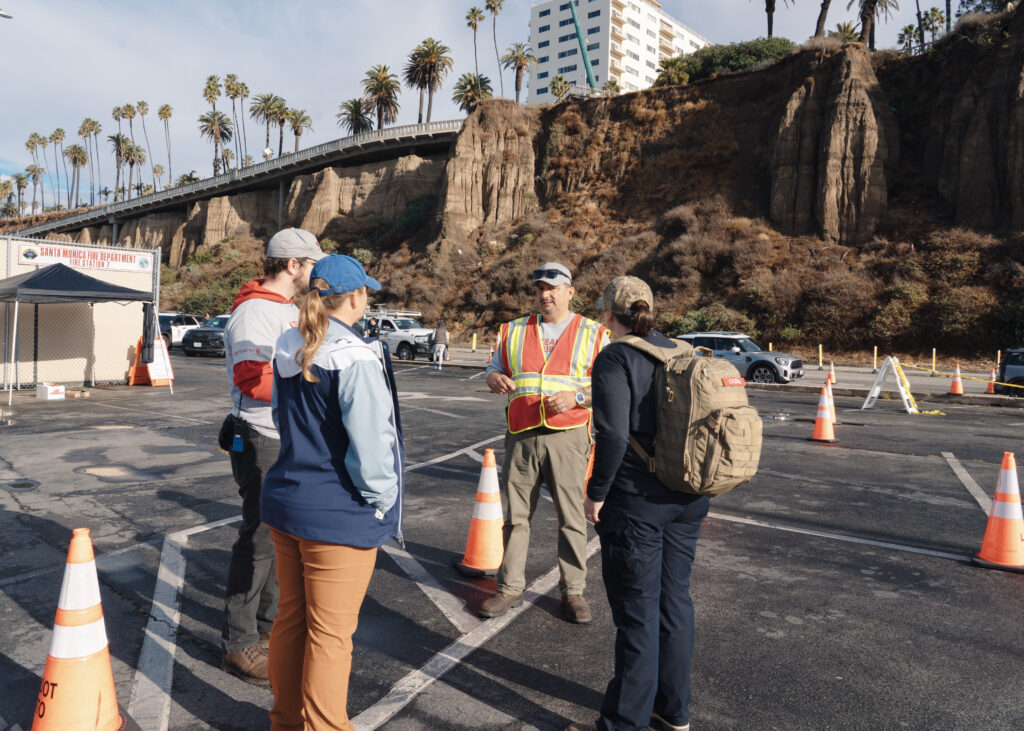Despite the 12-plus years I’ve spent in disaster relief, my time volunteering on the recent LA fires rocked me. In fact, I’ve been grappling with finding the right words to describe the devastation I’ve witnessed, and the stories I heard, as a volunteer with the sole NGO organization—Team Rubicon—granted secure access to the affected area of the Pacific Palisades fire.
Those who know me well—or who have served with me on any of the 25-plus operations I’ve deployed on since joining in 2013—know that I have a natural talent for gab or simply love to talk. Yet at this moment, I’m completely speechless.
I spent the initial few days on the ground in LA assisting the Los Angeles Fire Department in patrolling neighborhoods to help residents regain access to their homes. Sometimes, we demonstrated to the residents how to use the re-entry kits provided by the city. Other times, we LA fires volunteers were simply there to listen to their stories: of homes passed down through generations, cherished childhood memories, and dream homes that had been diligently worked on for so long, only to be reduced to nothing.

It was striking to observe how the fire selectively chose which homes to burn and which it spared. Sometimes, there were small islands of homes untouched. Other times, a house stood alone in a scarred landscape. Many of these homes we escorted survivors to had been reduced to ashes, leaving only chimneys or exposed plumbing. Virtually nothing had survived. Other homes that had survived appeared untouched, but they were not. The interiors were filled with smoke and ash from the outside, necessitating a complete renovation.
As an LA fires volunteer from out of state, meeting and hearing the stories of the local heroes who stayed and saved their homes and those of their neighbors with nothing more than garden hoses, a Home Depot bucket, and water from hot tubs and pools, was truly inspiring. I also had the privilege of meeting local celebrities who did the same. It was a testament to the bravery and selflessness of these individuals.
Some of the people we escorted into the post-fire zone had returned to their houses simply to bid farewell, knowing that they would never return home again. Others stood in awe, just like we did. I embraced many people simply because it was what they needed as they wept for their loss.
One of the most profound moments came as I watched a family bid farewell to their last sunset amidst the chaos and rubble of the recent disaster. Another time, it was a miracle to witness a family find their 40th-anniversary rings in the middle of that devastation. It chokes me up every time I recount it.
Over the last three days on the ground, a small group of us LA fires volunteers worked side-by-side with the men and women of the Los Angeles Police Department, the Mayor’s office, FEMA, and the Red Cross. We served as the control point for issuing city permits that allow residents to return to their neighborhoods. I had the privilege of speaking to about a thousand people each day as we issued permits and reentry kits and prepared them for what was to come.
As I listened to the stories of these LA fires survivors, and answered their family’s questions, one of the most poignant ones I encountered time and time again was, “How bad is it?” My response was always, “I don’t have the words.”
I didn’t have the words then, and I still don’t have them now. Thousands of homes and businesses were completely reduced to ashes and rubble. All I could do was empathize with them, knowing that I could never truly comprehend their loss. Some lost everything they had worked for or dreamed of in life.
Even now that I’m back from my time volunteering with Team Rubicon in LA, I carry those stories of heartbreak and loss within me, the images of their grief-stricken eyes, the crack in their voices, and the firsthand accounts of their devastation.
I will never forget what I witnessed and the efforts I made to assist those residents in their initial return home. While I am heartbroken, I am also filled with hope, having witnessed the resilience of the people of Malibu, Pacific Palisades, and Santa Monica.
Please don’t think that this in any way minimizes any other disaster that I have responded to or takes away from those still suffering from the horrific hurricanes that hit the East Coast this past year. Devastation is devastation, and all regions, disasters, and survivors should be treated equally. For some reason, this one just took an emotional toll on me like I’ve never experienced before.
As I return home, forever changed by my experiences in Los Angeles, I will never take what I have or any single day for granted ever again.



